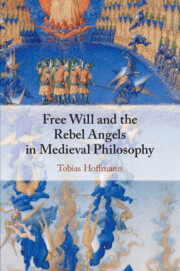Book contents
- Free Will and the Rebel Angels in Medieval Philosophy
- Free Will and the Rebel Angels in Medieval Philosophy
- Copyright page
- Dedication
- Contents
- Acknowledgments
- Abbreviations
- Citation Method
- Introduction
- Part I Free Will
- Chapter 1 Free Will with and without Aristotle
- Chapter 2 The Psychological Turn and the Rise of Intellectualism
- Chapter 3 Voluntarism and the Condemnation of Intellectualism
- Chapter 4 Intermediary Theories and Strict Intellectualism
- Chapter 5 Refinements and Radicalizations
- Part II Whence Evil?
- Part III Angelic Sin
- Bibliography
- Index of Manuscripts
- Index
Chapter 5 - Refinements and Radicalizations
from Part I - Free Will
Published online by Cambridge University Press: 26 November 2020
- Free Will and the Rebel Angels in Medieval Philosophy
- Free Will and the Rebel Angels in Medieval Philosophy
- Copyright page
- Dedication
- Contents
- Acknowledgments
- Abbreviations
- Citation Method
- Introduction
- Part I Free Will
- Chapter 1 Free Will with and without Aristotle
- Chapter 2 The Psychological Turn and the Rise of Intellectualism
- Chapter 3 Voluntarism and the Condemnation of Intellectualism
- Chapter 4 Intermediary Theories and Strict Intellectualism
- Chapter 5 Refinements and Radicalizations
- Part II Whence Evil?
- Part III Angelic Sin
- Bibliography
- Index of Manuscripts
- Index
Summary
Chapter 5 concerns the free will debate in the early fourteenth century. It thoroughly discusses the Franciscans Duns Scotus and William of Ockham, who make a sharp distinction between will and nature, that is, between a free power or cause that controls its act and one whose act is determined by external circumstances. Scotus and Ockham make the will more independent from a cognized good than previous thinkers. Using unedited texts, the chapter also presents what may well be the strongest statement of intellectualism at the time, by John of Pouilly, who builds on Godfrey of Fontaines to explain why, although our choices are moved by the cognized object, we control our choices. More briefly, the Dominicans Hervaeus Natalis and Durand of St. Pourçain are considered, whose general approach resembles Pouilly’s. As a thinker developing an intermediary theory, the chapter studies Peter Auriol, according to whom the will controls directly which judgment considered during deliberation becomes the final judgment that causes one’s choice. The dividing issue among these thinkers is, at bottom, whether the will controls its acts directly or only by means of deliberation.
Keywords
- Type
- Chapter
- Information
- Free Will and the Rebel Angels in Medieval Philosophy , pp. 119 - 160Publisher: Cambridge University PressPrint publication year: 2020

